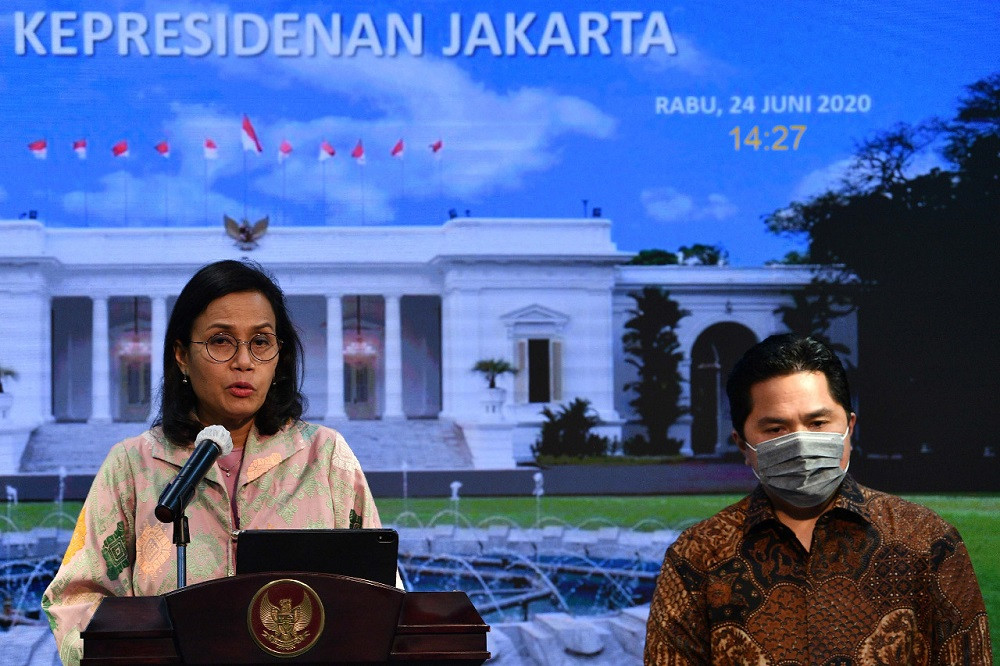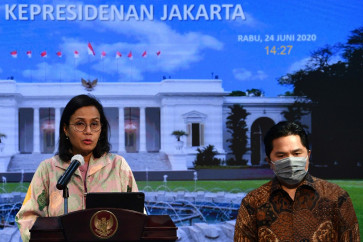Popular Reads
Top Results
Can't find what you're looking for?
View all search resultsPopular Reads
Top Results
Can't find what you're looking for?
View all search resultsAnalysis: Assessment of COVID-19 recovery programs
So how can the government quickly respond to safeguard the citizen’s while keeping economic activities running and ensuring the road to recovery is equally inclusive and justifiable? The government must be aware that the key factor to it is to ensure the wellbeing of its people, protect the poor and vulnerable and make sure that business continues to support the economic recovery after the COVID pandemic.
Change text size
Gift Premium Articles
to Anyone
 Hard cash: Finance Minister Sri Mulyani Indrawati (left) and State-Owned Enterprises Minister Erick Thohir announce the government’s placement of Rp 30 trillion (US$2.12 billion) in state banks on June 24. The funds will be channeled as loans to businesses to boost the real sector. (Antara/Sigid Kurniawan)
Hard cash: Finance Minister Sri Mulyani Indrawati (left) and State-Owned Enterprises Minister Erick Thohir announce the government’s placement of Rp 30 trillion (US$2.12 billion) in state banks on June 24. The funds will be channeled as loans to businesses to boost the real sector. (Antara/Sigid Kurniawan)
T
he COVID-19 outbreak continues to spread in every part of the world, while Indonesia has been trying to suppress the contagious virus for the past six months. During that time, the government has enacted large-scale social restrictions (PSBB) and people were told to stay at home and limit their outside activities. As a consequence, workers have started to lose jobs, healthcare facilities are overburdened, businesses cannot operate at full capacity and are at risk of default/closing, while the country is heading for a recession.
So how can the government quickly respond to safeguard the citizen’s while keeping economic activities running and ensuring the road to recovery is equally inclusive and justifiable? The government must be aware that the key factor to it is to ensure the wellbeing of its people, protect the poor and vulnerable and make sure that business continues to support the economic recovery after the COVID pandemic.
Since the pandemic began earlier this year, Indonesia’s poverty rate has increased by 0.37 percentage points within a year to 9.78 percent in March 2020. The jump has contributed an additional 1.28 million new poor people, while the Finance Ministry projected up to 5.71 million new poor people. In addition to that, it has also greatly affected low-end households with seasonal wages, especially due to the PSBB.
Due to disrupted economic activities, the Finance Ministry estimated up to 5.23 million new unemployed by the end of this year. This significant increase in poor and unemployed has eliminated the achievement in poverty alleviation over the past two years. With such a damaging outcome, the government must formulate a solid plan to overcome the problem and put up its best effort to minimize the setbacks and retain the economic and development achievements of the last two decades.
On the other side, Indonesia is more prepared and responsive to facing a sudden stop of economic and social activities today than it was during the Asian financial crisis of 1998. In May, the government prepared a National Economic Recovery program (PEN) through Government Regulation No. 23/2020 and adjusted national budget priorities accordingly. The government also vastly increased its emergency budget from Rp 405 trillion (US$27.45 billion) to Rp 695.2 trillion within 4 months, equivalent to 4.1 percent of GDP.
However, as the program is still ongoing, with some adjustment made along the way, the funds are being spent too slowly. The highest expenditure absorption rate is currently on social assistance at Rp 120.36 trillion or 59.03 percent, which is very helpful to increase household demand. However, the absorption rate for healthcare is still very low at Rp 16.31 trillion or 18.36 percent of the earmarked funds, which negatively impacts public health and wellbeing. If the government fails to quickly turn this situation around, it could prolong the economic recovery due to security and health concerns, as people become cautious and afraid of conducting social and economic activities.
Prior to the COVID-19 pandemic, the government regularly provided social aid to the 25 percent of families with the lowest income, or around 15.2 million families. For the social protection program, the government increased twice the allocated amount from Rp 103 trillion to Rp 203.9 trillion in less than six months. The social assistance program has also been extended from three months to nine months.

















